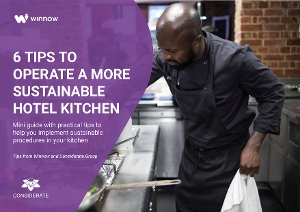Sustainable hospitality: Winnow and Considerate Group joined forces to write a guide sharing insights on how hotel kitchens can become more sustainable whilst reducing their operating costs and minimizing their environmental impact.
With food prices rising, competition increasing, and guests becoming more demanding, the next years are set to be incredibly challenging for hotel operators. Food waste, energy and water consumption, and other environmental issues, present substantial opportunity for the hospitality sector. But, a lot of operators have not yet realized the opportunities of addressing sustainability within their properties.
While over a billion people worldwide lack access to water, hotels can use up to 1,500 litres daily per occupied room. At the same time, in hotel kitchens, almost 40% of the energy consumed goes in the preparation and storage of food, but around 5%-15% of that food typically ends up in the bin. By becoming more sustainable, hotel kitchen can reduce costs and improve their environmental impact.
Nobody knows more about optimizing hotel kitchens than those who work closely with chefs and teams on a daily basis helping them improve their kitchen’s efficiency in a responsible way.
We know this because both Winnow and Considerate Group have many years of experience of doing that. We make sure that hundreds of hotels in over 30 countries can manage their food waste, save money and contribute to the environment at the same time.
Throughout our journey we have learned many valuable lessons to help operators optimize their kitchen’s workflow, saving them both time and resources. In this guide, we will share insights on how hotel kitchens can become more sustainable whilst reducing their operating costs and minimizing their environmental impact, with simple changes. While you download the guide, here it is a sneak a peek of what comes ahead:
Engage your staff: What gets measured gets managed. Understanding what type of food is being wasted and at what stage is important to take actions to reduce waste and save money.. This is mainly generated during the preparation of meals and can occur at any point of the production process:
Control your cost: We understand that in a busy professional kitchen it is easy to lose sight of spoilage, waste and choosing the appropriate training for your kitchen staff can be overwhelming. These details, however, can cause extra cost for your operations if they are not monitored and managed continuously.
Invest in tech: Technology provides great opportunities for your professional kitchen to streamline its workflow and improve profit margins. Technology tools can also help you keep on track with everything that is going on in your busy kitchen, including your sustainable projects.
Energy/gas: A lot of the electricity produced is still reliant on coal, oil, and gas, which are the main emitters of Greenhouse gases responsible for global warming. It is crucial to ensure efficient energy consumption in the hospitality sector in order to reduce our emissions.
Use water carefully: While over a billion people worldwide lack access to water, hotels can use up to 1,500 litres daily per occupied room. There are small steps each department can take to manage excess water consumption and reduce negative environmental impact.
Prevent food waste: One-third of all food produced for human consumption is wasted every year, costing approximately one trillion dollars. Reducing food waste not only makes environmental sense – it makes financial sense as well.
By focusing on these areas, hotel operators will not only increase their sustainability standards, but also, they will improve the overall efficiency of the kitchen's operation. Do you want to know more about how to pursue a sustainable and profitable business? Download the guide with 6 tips to operate a more sustainable hotel kitchen.










Comment on my blog